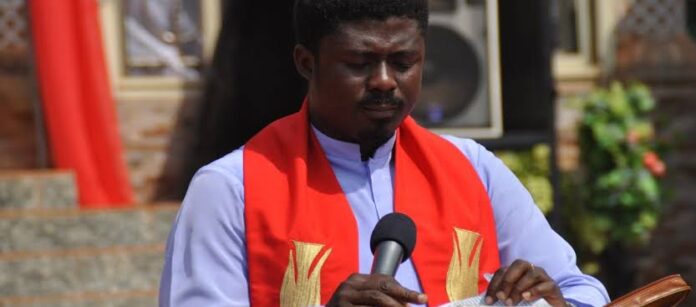Rev. Fr. Emmanuel Obimma, better known as Fada Ebube Muonso, has once again hurled sharp criticisms at Anambra State Governor Prof. Chukwuma Soludo, accusing him of not having any noteworthy accomplishments during his tenure. The fiery priest’s harsh remarks come as the state grapples with a surge in kidnappings and escalating security concerns.
Speaking during a sermon to his congregation in Uke, Idemili South Local Government Area on January 10, Rev. Fr. Muonso minced no words in declaring that Governor Soludo’s administration has left the state in a state of despair. According to him, Anambra, once regarded as one of the South-East’s leading states, has now been outpaced by its regional neighbors in terms of development and security.
In a passionate outburst, Rev. Fr. Muonso said, “Just the other day, the president was in Enugu to commission new projects. But here in Anambra, what are we commissioning? We have nothing to show for the leadership of this government except for the blood of the innocent, slain by kidnappers.”
A Deepening Crisis of Kidnappings
The priest’s criticism comes at a time when the state is facing an alarming wave of abductions. On Tuesday, two Reverend Sisters were kidnapped in Ajalli, a town in the state, only adding fuel to the fire of anger among locals.
Rev. Fr. Muonso, a well-known critic of the current administration, has repeatedly sounded the alarm over the rising insecurity in the state. His outbursts are fueled by what he perceives as the government’s failure to respond effectively to the growing menace of kidnapping and other violent crimes.
“They want to attack me instead of confronting the real issues at hand,” said Rev. Fr. Muonso, addressing the media’s response to his earlier remarks. “The government is busy attacking me, yet two Reverend Sisters were abducted yesterday. This government has failed.”
In his remarks, the priest lamented the lack of progress in Soludo’s government, emphasizing that the state’s infrastructure projects, especially those under the governor’s supposed reforms, were nothing more than hollow promises. “The roads they claim to be building are substandard,” Muonso added. “Go and look at them. They are just a facade.”
Confronting the Leadership Failure
Rev. Fr. Muonso’s vocal stance against Soludo is not new. Their relationship has been marked by public clashes, with the priest often voicing his dissatisfaction with the governor’s policies, especially regarding security and governance. Most recently, the priest took issue with comments made by Anambra’s Commissioner for Information, Dr. Law Mefor, who referred to him as a “false prophet” in a published article.
In response, the fiery cleric retorted, “One thing that is good is that I’m the one they are attacking. But their day will come. Those who are attacking me, those media rats writing nonsense, will soon see the truth.”
The priest’s sharp words seemed to suggest that he believes those in power are more focused on silencing dissent than addressing the real issues of governance. “Instead of focusing on the issue of insecurity, they are busy launching attacks on a man of God,” he added.
State of Emergency in Anambra
Anambra has been struggling with mounting insecurity for several years now, particularly in the rural areas. Kidnapping for ransom has become a rampant issue, with both residents and travelers frequently falling victim to criminal gangs. The state’s security forces have often been criticized for their inability to curb the rising tide of violence.
In a desperate plea for action, Rev. Fr. Muonso called for immediate measures to curb the kidnapping crisis, warning that the failure to act would only make the state more dangerous. He specifically called for stronger collaboration between the government, security agencies, and local communities to tackle the growing problem.
“Anambra used to be a place where people could walk around freely, but now it’s a place of fear,” he said. “If Soludo does not act soon, the state will be overrun by criminals. It’s time for the government to step up and protect its people.”
Despite the grim picture painted by the priest, Governor Soludo has yet to issue an official response to the latest accusations. However, sources close to the governor’s office have stated that the state government is committed to addressing security issues in the state but has faced several challenges, including inadequate funding and coordination between various law enforcement agencies.
The Political Backdrop
The spat between Rev. Fr. Muonso and Governor Soludo also has political undertones. Soludo, a former central bank governor, was elected as Anambra’s governor in 2021, promising a change in the state’s fortunes. However, his leadership has been marked by several controversies, including dissatisfaction with his handling of the state’s security situation.
Political analysts have suggested that Rev. Fr. Muonso’s continued criticism of Soludo may also be rooted in the priest’s alignment with certain political factions that oppose the governor’s administration. Despite this, his criticisms resonate with many Anambra residents who feel let down by the state’s inability to deliver on promises of development and security.
In the last two years, Anambra has witnessed a surge in political tensions, particularly with the state’s continued struggles against insurgent groups and criminal cartels operating within its borders. The people’s frustration has reached a boiling point, with many seeing the priest’s critiques as a reflection of the broader dissatisfaction with the government.
Community Reaction and Growing Desperation
Members of the local community have echoed Rev. Fr. Muonso’s concerns. In interviews with local media, several residents of Anambra expressed frustration with the state’s leadership and the lack of tangible results in Soludo’s governance.
“We have seen no change,” said one local resident. “The roads are bad, the schools are in ruins, and we are constantly in fear of kidnappers. What is the government doing? It’s time for them to act or step aside.”
Others have pointed to the governor’s failure to address critical infrastructural challenges and his focus on less urgent matters, further deepening the divide between the people and the leadership.

